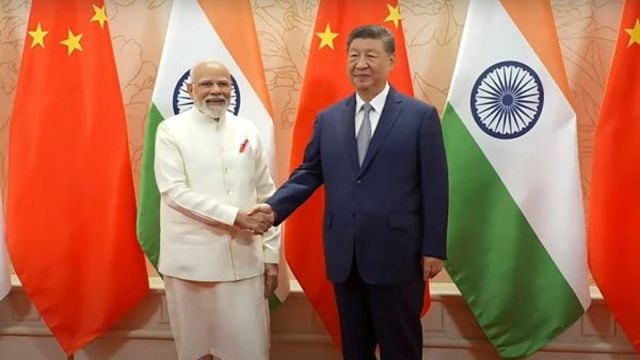Underlining the move to repair bilateral ties — after a five-year military standoff along the Line of Actual Control (LAC) in eastern Ladakh — Prime Minister Narendra Modi and Chinese President Xi Jinping emphasised on Sunday that the two countries were “partners, not rivals”, marking an important shift in India’s position on China as both sides work towards gradual normalisation.
The two leaders met on the sidelines of the Shanghai Cooperation Organisation (SCO) Summit here — this is Modi’s first visit to China in seven years. The two sides agreed on a “fair, reasonable and mutually acceptable resolution” of the border issue, and flagged the importance of a multipolar world, free trade and “role of their two economies to stabilise world trade,” the Ministry of External Affairs (MEA) said in a statement.

The meeting — their second in the last 10 months — comes in the backdrop of the deepening trust deficit between India and the United States over the 50 per cent tariffs imposed by the Donald Trump administration.
Significantly, the MEA said Modi noted that “India and China both pursue strategic autonomy, and their relations should not be seen through a third country lens.” Xi said the two countries should strengthen “multilateral cooperation to safeguard common interests”, and should “not let the border issue define the overall China-India relationship”, according to a Chinese Foreign Ministry statement.
Later, asked if the US tariffs issue was discussed, Foreign Secretary Vikram Misri said the focus was on bilateral domain, but the international trade situation did come up.
The bilateral meeting lasted for about an hour. Modi and Xi last met on the sidelines of the BRICS leaders’ summit in Russia’s Kazan last October, when their talks resulted in disengagement of troops from two key friction points in eastern Ladakh.
“Last year in Kazan, we had very productive discussions, which gave a positive direction to our relations,” Modi told Xi on Sunday. “After the disengagement at the border, an atmosphere of peace and stability is now in place,” he said. This is an important assessment of the current situation, where 50,000 to 60,000 troops are still deployed along the LAC. “We are committed to advancing our relations based on mutual trust, respect, and sensitivity,” Modi said.
Story continues below this ad
Asked about the framing of India and China as partners, not rivals, Misri later said: “This is the framing of the relationship… both leaders have done this framing…this is what is desired, and this is what they see as the future of the relationship as well. The troops at the border, which are a reality — though I think that is, again, a situation that has started evolving over the course of the last year, as the situation at the borders… is moving towards normalisation… that is something that has come about as a result of actions that are being taken at a particular point in time, and that’s obviously led to a certain crisis. And it is that crisis that we have dealt with or attempted to deal with over the course of the last five-and-a-half years… doesn’t change the fact that the two leaders are… not just these two leaders, but previous leaders as well… But what they have framed for the medium to long-term future of the relationship, which is that we should try being two large neighbours, that we are to each other, being two of the largest economies in the world… that the future that we should aspire to… is one of partnership and not one of rivalry.”
The Chinese Foreign Ministry statement quoted Xi as saying that “being good-neighborly friends and partners for mutual success, and achieving a ‘Dancing of the Dragon and the Elephant’ should be the right choice for both China and India”. According to the statement, Xi also said that “last year’s successful meeting in Kazan marked the restart of China-India relations, with exchanges and cooperation between the two countries making continuous progress”.
“Our Special Representatives have also reached an agreement on border management,” Modi said, referring to the two meetings between National Security Advisor Ajit Doval and Chinese Foreign Minister and Politburo member Wang Yi in December last year and August this year. Underlining the steps taken towards stabilisation of ties, he said: “The Kailash Mansarovar Yatra has resumed. Direct flights are also being resumed between the two countries.” This is the first time that the PM has announced the resumption of direct flights. “Our cooperation is linked to the interests of 2.8 billion people of our two countries. This will also pave the way for the welfare of all humanity,” he said.
“Had a fruitful meeting… We reviewed the positive momentum in India-China relations since our last meeting in Kazan. We agreed on the importance of maintaining peace and tranquility in border areas and reaffirmed our commitment to cooperation based on mutual respect, mutual interest and mutual sensitivity,” Modi posted on X after his bilateral meeting at noon.
Story continues below this ad
Modi was accompanied by Doval and Misri; External Affairs Minister S Jaishankar was not present as he had some “personal issues”, sources said. Xi was accompanied by Wang Yi.
The two leaders also met later in the evening at the banquet hosted by Xi for the SCO leaders.
“China and India, two ancient Eastern civilizations, are the world’s two most populous countries, and important members of the Global South…They shoulder the important responsibility of benefiting their peoples, promoting unity and revitalisation among developing countries, and advancing the progress of human society. Being good-neighborly friends and partners for mutual success, and achieving a ‘Dancing of the Dragon and the Elephant’ should be the right choice for both China and India,” Xi was quoted as saying by the Chinese Foreign Ministry.
The Chinese statement said Xi emphasised that “this year marks the 75th anniversary of the establishment of diplomatic ties between China and India. Both sides should view and handle China-India relations from a strategic and long-term perspective, further elevate them through the Tianjin summit, and promote the sustained, healthy and stable development of bilateral relations.”
Story continues below this ad
“First, they should strengthen strategic communication and deepen mutual trust. As long as they remain committed to the overarching principle of being partners, not rivals, and providing development opportunities, not threats, for each other, China-India relations will flourish and move forward steadily,” Xi was quoted as saying.
“Second, they should expand exchanges and cooperation to achieve mutual benefit and win-win results. Both China and India are at a critical stage of development and revitalisation. They should focus on development as their greatest common denominator, supporting, promoting and achieving mutual success… Third, they should accommodate each other’s concerns and uphold harmonious coexistence. The Five Principles of Peaceful Coexistence, advocated by the older generation of leaders of China and India over 70 years ago, must be cherished and promoted. They should work together to maintain peace and tranquility in the border areas and not let the border issue define the overall China-India relationship,” he said.
“Fourth, they should strengthen multilateral cooperation to safeguard common interests. We must jointly demonstrate historical responsibility, uphold multilateralism, strengthen communication and cooperation on major international and regional issues, defend international fairness and justice, work together to promote a multipolar world and the democratisation of international relations, and make due contributions to maintaining peace and prosperity in Asia and the world,” he said.
In its statement, the MEA said: “Both leaders welcomed the positive momentum and steady progress in bilateral relations since their last meeting in Kazan in October 2024. They reaffirmed that the two countries were development partners and not rivals, and that their differences should not turn into disputes. A stable relationship and cooperation between India and China and their 2.8 billion peoples on the basis of mutual respect, mutual interest and mutual sensitivity are necessary for the growth and development of the two countries, as well as for a multipolar world and a multi-polar Asia befitting the trends of the 21st century.”
Story continues below this ad
On the border situation, it said Modi “underlined the importance of peace and tranquility on the border areas for continued development of bilateral relations. The two leaders noted with satisfaction the successful disengagement last year and the maintenance of peace and tranquility along the border areas since then. They expressed commitment to a fair, reasonable and mutually acceptable resolution of the boundary question proceeding from the political perspective of their overall bilateral relations and the long-term interests of the two peoples. They recognised the important decisions taken by the two Special Representatives in their talks earlier this month, and agreed to further support their efforts”.
Listing the steps towards stabilisation of ties, the two leaders noted the “need to strengthen people-to-people ties through direct flights and visa facilitation, building on the resumption of Kailash Mansarovar Yatra and tourist visa,” it said. On resuming direct flights, Misri later said the aviation authorities had met and would discuss the next steps.
“On economic and trade relations, they recognised the role of their two economies to stabilise world trade. They underlined the need to proceed from a political and strategic direction to expand bilateral trade and investment ties and reduce trade deficit,” the MEA said, referring to the ballooning trade deficit. Misri also flagged the importance of the issue, and said that the matter was raised by Modi.
Significantly, the MEA statement said Modi noted that “India and China both pursue strategic autonomy, and their relations should not be seen through a third country lens.” This can be seen as an oblique reference to the United States. “The two leaders deemed it necessary to expand common ground on bilateral, regional and global issues and challenges, like terrorism and fair trade in multilateral platforms,” it said.
Story continues below this ad
Earlier, the Chinese envoy had said Beijing would support New Delhi on the imposition of tariffs by the US.
Modi expressed support for China’s Presidency of the SCO, and also invited Xi to the BRICS Summit that India will be hosting in 2026, the MEA said.
The statement said Modi also had a meeting with Cai Qi, Member of the Standing Committee of the Politburo of the Communist Party of China. “Prime Minister shared with Mr Cai his vision for bilateral relations and sought his support to realise
the vision of the two leaders. Mr Cai reiterated the Chinese side’s desire to expand bilateral exchanges and further improve relations in line with the consensus reached between the two leaders,” the MEA said.
Story continues below this ad
Misri said that Cai had offered to host Modi for a dinner, but that could not take place because of the PM’s schedule.
The Prime Minister flew from Japan to Tianjin for the SCO summit from August 31 to September 1. Indian officials have been cautious about the meeting with Xi being framed as a major bilateral meeting. For Delhi, this is a visit for a multilateral summit and a bilateral with the host leader is not unusual.
But the global situation, especially the strain in ties between Delhi and Washington following Trump’s announcement of 50 per cent tariffs on India, and his administration’s daily diatribe over India’s import of Russian oil, has complicated the situation for Delhi. It is against this backdrop that Delhi has come to Tianjin and hopes that the exercise to repair India-China ties is carried forward.









